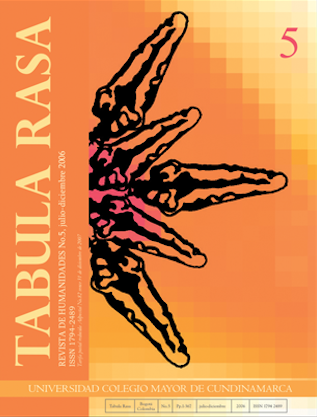Neither Orientalism nor Occidentalism: Edward W. Said and Latin Americanism
Ni orientalismo ni occidentalismo: Edward w. Said y el Latinoamericanismo
Show authors biography
The article begins with a discussion of the methodological breakthrough made by Said in his magisterial Orientalism, which it is claimed also informed his subsequent works. He is defended against critics who impute on him with, and impugn him for, Foucauldian sins. Said is instead shown to be an innovative philosophical mind that confronted the methodological challenges of his project frontally and self-consciously. In a second part, the author considers the importance of Edward Said’s pioneering trope of Orientalism for the development of a unique form of Latin American criticism. While Roberto Retamar approximated the central ideas of Orientalism in his book Caliban, he did it with reference to a literary trope that partly concealed its critical usefulness. The next section discusses the ways in which a parallel discourse emerged during the later sixties and early seventies, namely Liberation Philosophy. Particular attention is given to the early work of Enrique Dussel and his agenda of a “geopolitics of philosophy.” The next stage of the development of the fertilization of Latin American critical discourses by Edward Said’s Orientalism work begins with the emergence of a trans-American Latino critical community that includes Fernando Coronil, Walter Mignolo, Santiago Castro-Gómez, and Ofelia Schutte. The overall aim is to chronicle, document, and underscore the ways in which Edward’s Said’s theses about Orientalism have productively influenced the emerge of a unique type of discourse that has been called “latinamericanism.”
Article visits 164 | PDF visits 77
Downloads
Appiah, Anthony. 1992. In my Father’s House: Africa in the Philosophy of Culture. Nueva York: Oxford University Press.
Ardao, Arturo. 1993. América Latina y la latinidad . México: Universidad Nacional Autónoma de México.
Ashcroft, Bill. 2001. “Latin America and post-colonial transformation”, en: Bill Aschroft, On Post-Colonial Futures: Writing past colonialism. 22-35. Nueva York: Continuum. Batstone, David; Mendieta, Eduardo; Lorentzen, Lois Ann y Dwight N. Hopkins, (eds).
1997. Liberation Theologies, Postmodernity, and the Americas. Nueva York: Routledge.
Campa, Román de la. 1999. Latinamericanism. Minneapolis: University of Minnesota Press.
Castro-Gómez, Santiago. 1996. Crítica de la razón latinoamericana. Barcelona: Puvill Libros, S.A.
Chomsky, Noam. et al. 1997. The Cold War & the University: Toward an Intellectual History of the Postwar Years. Nueva York: The New Press.
Clifford, James. 1988. The Predicament of Culture: Twentieth-Century Ethnography, Literature,
and Art. Cambridge, MA: Harvard University Press.
Coronil, Fernando. 1996. “Beyond Occidentalism: Toward Nonimperial Geohistorical Categories” Cultural Anthropology 11, No. 1:52-87.
Franco, Jean. 2002. The Decline & Fall of the Lettered City. Cambridge, Mass.: Harvard University Press.
Hay, Denys. 1957. Europe: The Emergence of an Idea. Edinburgh: The Edinburgh University Press.
Henríquez Ureña, Pedro. 1978. La Utopía de América. Caracas: Biblioteca Ayacucho.
Huntington, Samuel P. 1997. The Clash of Civilizations and the Remaking of the World Order.
New York: Simon & Schuster.
Ianni, Octavio. 1998. La Sociedad Global. (México: Siglo XXI.
Kaplan, Amy. 1993. “Left Alone with America” en Cultures of United States Imperialism, eds.
Amy Kaplan y Donald E. Pease. 3-21. Durham, NC: Duke University Press.
Martí, José. 1977. Nuestra América. Caracas: Biblioteca Ayacucho.
Mignolo, Walter. 1993. “Colonial and postcolonial discourse: cultural critique or academic
colonialism” Latin American Research Review, Vol 38, No. 3: 120-134.
Pagden, Anthony. (ed.). 2002. The Idea of Europe: From Antiquity to the European Union. Cambridge, UK: Cambridge University Press.
Pletsch, Carl E. 1981. “The Three Worlds, of the Division of Social Scientific Labor, circa 1950-1975” Comparative Studies in Society and History 23, no. 4:565-90.
Poblete, Juan (ed). 2003. Critical Latinamerican and Latino Studies. Minneapolis: University of Minnesota Press.
Ranke, Leopoldo von. 1909 [1824]). History of the Latin and Teutonic Nations (1494 to 1514). Londres. George Bell & Sons.
Rodó, José Enrique. 1988. Ariel. Austin: University of Texas Press.
Rosenstone, Robert A. 1975. Romantic Revolutionary: A Biography of John Reed. Nueva York:
Alfred A. Knopf.
Said, Edward. 2003. Humanism and Democratic Criticism. Nueva York: Columbia University Press.
Said, Edward. 2001. Power, Politics, and Culture: Interviews with Edward W. Said, editado con una introducción de Gauri Viswanathan. Nueva York: Pantheon Books.
Said, Edward. 2000. Reflections on Exile and Other Essays. Cambridge, MA: Harvard University Press.
Said, Edward. 1997 [1981]. Covering Islam: How the Media and the Experts Determine How we Se the Rest of the World, edición revisada. Nueva York: Vintage Books. La versión en español se publicó como Cubriendo el islam: cómo los medios de comunicación y los expertos determinan nuestra visión del resto del mundo (Madrid: Debate, 2005).
Said, Edward. 1996. Culture and Imperialism. Nueva York: Vintage. Publicada en español como Cultura e imperialismo, Barcelona, Anagrama, 1996.
Said, Edward. 1979. Orientalism. Nueva York: Vintage.
Sarmiento, Domingo. 1868. Life in the Argentine Republic in the Days of the Tyrants: or Civilization and Barbarism. Nueva York: The Hafner Library Classics.
Wilson, Christopher P. 1993. “Plotting the Border: John Reed, Pancho Villa, and Insurgent Mexico”, en Cultures of United States Imperialism, Amy Kaplan y Donald E. Pease, eds. 340- 361. Durham, NC: Duke University Press.




